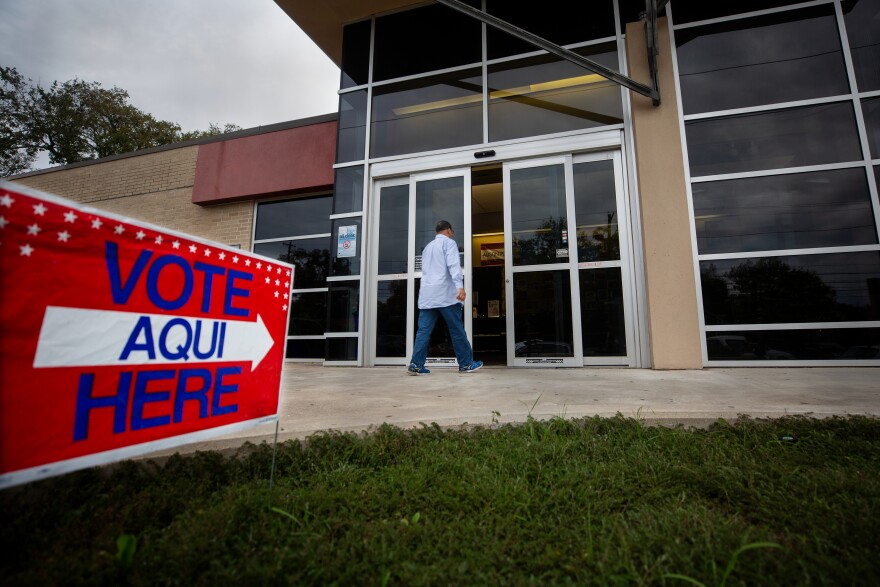Texas announced last week that it will leave a national voter fraud prevention coalition.
The Electronic Information Registration Center, or ERIC, is used by over half of U.S. states to maintain accurate voter rolls by comparing data and weeding out duplicates. The bipartisan group was once hailed as a tool to prevent voter fraud, until it became the target of election conspiracy theories last year.
Texas is the ninth and largest state to withdraw from the program.
Mimi Marziani, an adjunct professor at the University of Texas at Austin School of Law says the state is required by law to participate in an information-sharing system like ERIC, but no viable alternatives exist right now. Listen to the interview above or read the transcript below.
This transcript has been edited lightly for clarity:
Texas Standard: How is ERIC supposed to work and how long has it been in place?
Mimi Marziani: So ERIC has been in place since 2012, and it’s an information sharing database. So the idea is that states pool information, data experts combine that with some national data, and then the states have the ability to better identify voters who have died or are otherwise ineligible to make sure their roles are accurate and up to date.
Can you explain why so many states now, including Texas, have left the system?
I’ll try.
I mean, ERIC has historically been uncontroversial. And actually, Texas has been a member of ERIC since 2020 and is required by law to participate in a multi-state data sharing program, which is, again, exactly what ERIC does.
In the last year or so, there has been a small but clearly influential group of right wing activists who have become convinced that ERIC was possibly benefiting Democrats, possibly some big privacy concerns. I mean, multiple investigations have shown these claims are baseless, but those activists have been able to exert enough political pressure to get several Republican-run states to withdraw, including Texas.
Do I understand correctly that ERIC primarily existed so that election officials could detect and then delete duplicate registrations? Is that the prime purpose of a system like ERIC?
That’s correct.
So the United States does not have a national database of registered voters or any sort of national ID system. So instead, even though there’s things like the National Voter Registration Act and the Help America Vote Act that directs states to keep their rolls up to date, there’s no way for states to do that by kind of turning to the federal government. And so, ERIC was the solution to that.
But didn’t you say that Texas was required by law to be part of some kind of multi-state database?
Yeah, it is. Which is one of the reasons that Texas leaving ERIC is so surprising and also honestly leaving us in a fairly perilous situation, running up to the 2024 elections.
So what alternatives exist?
So I am not aware of a viable alternative at this time. There have been efforts over the years to create alternatives to ERIC. They’ve never gotten off the ground.
I mean, it takes significant multi-state buy-in and professional data matching services. You know, ERIC has worked for over a decade to be able to create the organization it has today and actually Votebeat had a wonderful story a couple of months ago and interviewed experts all over the country and nobody could identify an alternative. And the secretary of state’s office also has not identified an alternative.
It wasn’t perfect to begin with, presumably because you didn’t have all states buying into ERIC. So it wasn’t 100% conclusive that the person that you might think is on one roll or may be missing from the ERIC database wasn’t in fact in some other state, correct?
Yeah that’s right.
So I mean, at the beginning of this year, 32 states plus Washington D.C. had opted into ERIC. So that’s not 100%. But also that is the absolute best database that has existed before Texas joined ERIC.
There are many, very famous, instances of Texas using bad data to try to purge eligible voters from the rolls. You might remember this happened most recently in 2019 when the state used a sloppy data matching scheme to try to remove close to 100,000 voters, claiming they weren’t citizens.
So you mentioned this is happening in the run up to the 2024 election. How could Texas’ exodus from ERIC or the exodus of other states really affect the outcome of that election and the aftermath?
The most likely result is that the rolls will become less accurate because the state and the county officials who really administer the voter rolls are going to have less data to identify voters who should be removed.
I’m also very concerned about more sloppy attempts to try to remove voters from the rolls based on bad data. Again, we saw that in 2019.
In 2012, the state also tried to remove tens of thousands of voters from the rolls, claiming that these people were deceased. They were sued by several voters who were very much alive and won that lawsuit, as well. And I mean, unfortunately, those are the most likely implications.
If you found the reporting above valuable, please consider making a donation to support it here. Your gift helps pay for everything you find on texasstandard.org and KUT.org. Thanks for donating today.

